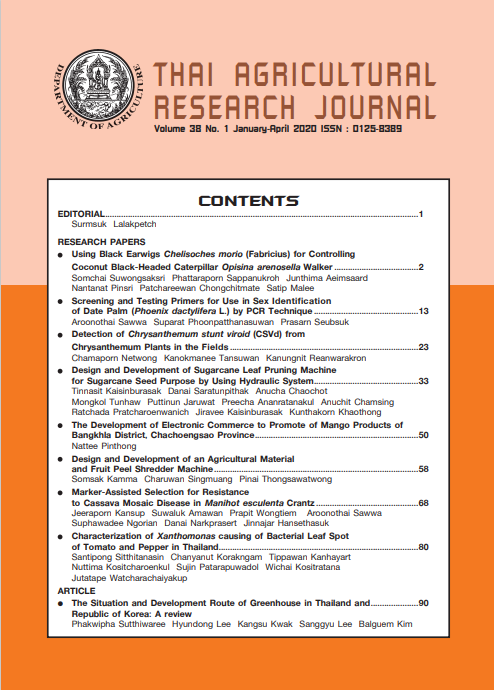Screening and Testing Primers for Use in Sex Identification of Date Palm (Phoenix dactylifera L.) by PCR Technique
DOI:
https://doi.org/10.14456/thaidoa-agres.2020.1Keywords:
Date Palm, Sex identification, DNA marker, Date Palm, sex identification, DNA markerAbstract
Date palm (Phoenix dactylifera L.) is a dioecious plant with a very slow growth rate and late reproductive phase. The sex of plants became known only at the time of first flowering that takes around 3-7 years after seeding. This research aims to study the DNA markers for sex determination in the seedling stage by PCR technique. Thirty-nine primer pairs from reporting and new designing were used to screen and examine of date palm sex. Results, the primers, DpDOAmale5F and DpDOAmale4R could identify sex of plants. The PCR product was generated with the length approximately 450 bp as specific to male plant. DNA extraction steps were developed to doing faster through comparison the methods between metal beads with Homogenizer and CTAB with liquid nitrogen. Both methods presented similar of DNA purity, while metal beads with Homogenizer methods was reduced time and cost. To validate male-specific primer, genomic DNA 120 individual known sex plants belonging to KL1 and Bahee varieties of date palm were amplified. The primers displayed specific to male plant in 100 percentages of individuals. Furthermore, the male-specific marker used to investigate the sex ratio in seedling stage with 4-12 months of age. The sex detection of 483 seedling samples was showed 42 percentages of male plant. However, this DNA marker could be used for sex determination of date palm in seedling stage and useful to decrease time and cost for crop managements.
References
จารุฉัตร เขนยทิพย์. 2558. วิจัยและพัฒนาพันธุ์อินทผลัม. รายงานโครงการวิจัย กรมวิชาการเกษตร. 26 หน้า.
นพรัตน์ อินถา, กวี สุจิปุลิ, ปิยรัษฏ์ ปริญญาพงษ์ เจริญทรัพย์ และ พีระศักดิ์ ฉายประสาท.2558. การพัฒนาเครื่องหมายดีเอ็นเอเพื่อใช้ในการจำแนกเพศอินทผลัมไทย (แม่โจ้36). วารสารเกษตรพระจอมเกล้า ปีที่ 33 ฉบับพิเศษ 1 การประชุมวิชาการพืชสวนแห่งชาติ ครั้งที่ 14 “พืชสวนไทยไร้พรมแดน”. หน้า 68-73.
Al-Mohmoud M.E., E.K. Al-Dous. E.K. Al-Azwani and J.A. Malek. 2012. DNA-based assays to distinguish date palm (Arecaceae) gender. American Journal of Botany. e7-e10
Billotte, N., N. Marseillac, P. Brottier, J.L. Noyer, J.P. Jacquemoud-Collet, C. Moreau, T. Couvreur, M.H. Chevallier, J.C. Pintaud and A.M. Risterucci. 2004. Nuclear microsatellite markers for the date palm (Phoenix dactylifera L.): characterization and utility across the genus Phoenix and in other palm genera. Molecular Ecology Notes 4: 256-256.
Cherif E., S. Zehdi, K. Castillo, N. Chabrillange, S. Abdoulkader, J.C. Pintaud, S. Santoni, A. Salhi-Hannachi, S. Glemin and F. Aberlenc-Bertossi. 2012. Male-specific DNA markers provide genetic evidence of XY chromosome system, a recombination arrest and allow the tracing of paternal lineages in date palm. New Phytologist 197: 409-415.
Dhawan, C., P. Kharb, R. Sharma, S. Uppal and R.K. Aggarwal. 2013. Development of Male-Specific Scar Marker in Date Palm (Phoenix Dactylifera L.). Tree Genetics & Genomes. 9(5): 1143-1150.
Elmeer K. and I. Mattat. 2012. Marker-asisted sex differentiation in date palm using simple sequence repeats. Biotech 2: 241-247.
FAO: Food and Agriculture Organization of the United Nations. 2017. Worldwide dates production statistics. Last update 15 December 2017. http://www.fao.org/faostat/en/#data/QC
Wellmann A.P, A.H. Escobar and D.V. Johnson. 2007. Date palm cultivation in Chile and Peru (South America): current status and future prospects for development. Acta Hort 736: 71-85.
Wrigley G. 1995. Date palm, Phoenix dactylifera. In: Smartt J, Simmonds NW (eds), Evolution of crop plants, 2nd ed. Longman, London: pp. 399-403.
Downloads
Published
How to Cite
Issue
Section
License
Thai Agricultural Research Journal



